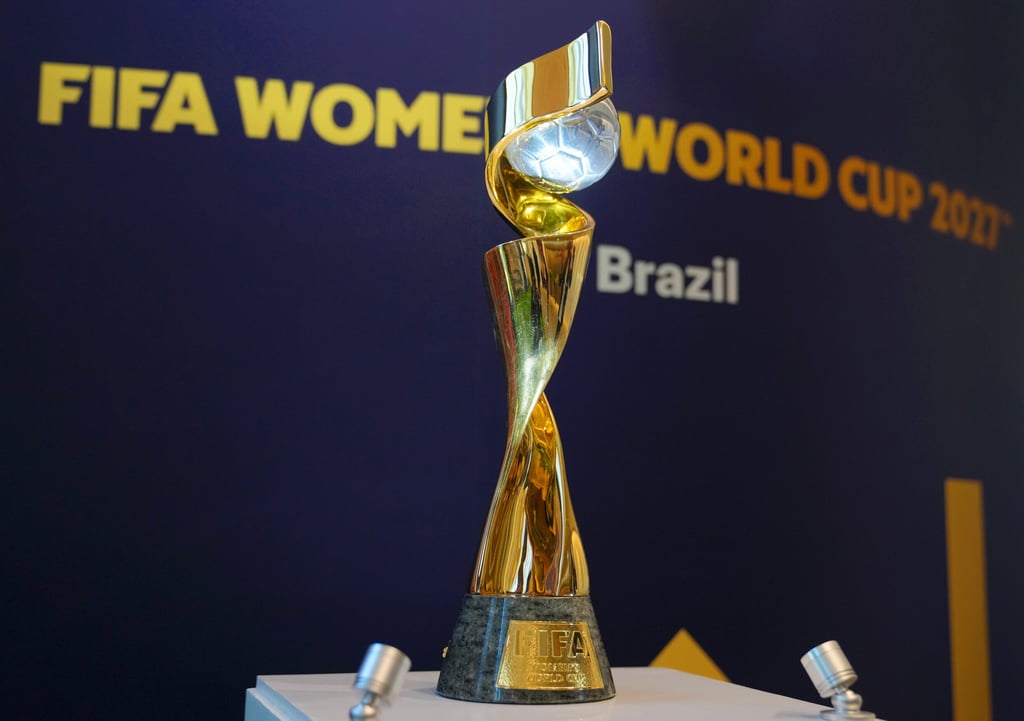FIFA Unveils Host Cities for 2027 Women’s World Cup: Emma Hayes and USWNT Eye Victory
SPORT
5/10/20257 min read


Introduction to the 2027 Women's World Cup
The Women's World Cup has evolved into one of the most significant sporting events on the global stage, showcasing not only the talent of female athletes but also the growing popularity of women’s football. Since its inception in 1991, the tournament has seen remarkable growth, both in terms of participation and viewership. With each edition, the competition has been enhanced by increasing investment in women’s sports and greater visibility in media coverage, allowing fans to engage more deeply with the games and the athletes.
The upcoming 2027 Women’s World Cup is set to continue this trajectory, with heightened anticipation from fans, players, and teams alike. For the United States Women's National Team (USWNT), this tournament promises to be a critical moment. Notably, Emma Hayes, a respected figure in women's football, will be looking to guide the team to success, as they aim to secure yet another title. The excitement surrounding the competition is palpable, as it not only represents the pinnacle of women's football but also serves as a platform for showcasing emerging talent on an international scale.
Announcement of Host Cities
FIFA has officially announced the cities selected as hosts for the highly anticipated 2027 Women’s World Cup, marking a significant milestone in the history of women's soccer. The chosen cities, renowned for their vibrant culture and strong sporting tradition, are Atlanta, Boston, Dallas, Houston, Kansas City, Los Angeles, Miami, New York/New Jersey, Philadelphia, San Francisco/Bay Area, Seattle, and Washington D.C. Each of these locations possesses unique attributes that contribute to a rich and immersive experience for teams and fans alike.
These cities stand out not only for their extensive infrastructure but also for their previous experience in hosting major sports events. For instance, Los Angeles is well-known for its historic sporting venues, including the iconic Rose Bowl and the recently renovated SoFi Stadium. Similarly, New York/New Jersey's MetLife Stadium is a state-of-the-art facility that has been the site of numerous high-profile events, making it an ideal setting for the World Cup.
The selection process for these host cities was thorough and detailed. FIFA considered various criteria, including stadium capacity, accessibility, local infrastructure, and the overall enthusiasm and support for women’s soccer in each city. The goal was to foster an environment conducive to both elite competition and community involvement. Cities demonstrated their commitment by showcasing plans for fan engagement and initiatives aimed at promoting women’s sports, ensuring a lasting legacy for the tournament.
As excitement builds for the 2027 Women’s World Cup, these selected cities are preparing to welcome teams and fans from around the globe, offering a unique blend of sporting excellence and cultural richness. The event promises to be a celebration of women’s soccer, with cities ready to showcase their commitment to diversity, inclusion, and sporting spirit.
Emma Hayes: Vision and Leadership
Emma Hayes has cemented her status as a pivotal figure in women’s football through her remarkable coaching journey and strategic vision for the future of the sport. Currently the manager of Chelsea FC Women, Hayes has consistently demonstrated an understanding of the game that transcends conventional tactics, focusing on both the technical and psychological aspects of player development. Her leadership style is characterized by an emphasis on fostering a competitive yet nurturing environment, which has been instrumental in the success of her teams.
Hayes’ achievements in women’s football are noteworthy; she has steered Chelsea to multiple FA Women’s Super League titles and domestic cup victories, highlighting her ability to cultivate talent and optimize team dynamics. This meticulous attention to detail is evident in the way she prepares her players for high-pressure scenarios, ensuring they are equipped not only with skills but also with strong mental fortitude. Her approach serves as a testament to her revolutionary mindset, which shifts the focus from merely winning to developing well-rounded athletes prepared for national and international competitions.
As the USWNT gears up for the 2027 Women’s World Cup, Hayes' vision emerges as a crucial element in the team's strategy. She is committed to creating an inclusive atmosphere where diverse tactics are explored, thereby equipping players to adapt to varied styles of play they may encounter on the global stage. With an eye toward fostering synergy within the team, her leadership aims to inject vitality and enthusiasm into training routines, enhancing collaboration on and off the field. Emma Hayes embodies the future of women’s football leadership, and her influence is poised to drive the USWNT toward anticipated victory in the upcoming World Cup.
USWNT's Road to Victory
The United States Women's National Team (USWNT) is set to embark on a challenging journey toward the 2027 Women’s World Cup, in which they aim for yet another victory. Their recent performances on the international stage have set high expectations, yet, the road to triumph will not be devoid of hurdles. Analysis of the squad’s strengths and weaknesses is essential to understand their path forward.
Historically, the USWNT has maintained a reputation for excellence, winning multiple World Cups. However, the competitive landscape of women’s football is evolving, with numerous nations investing significantly in their women’s programs. Thus, the USWNT must adapt their strategies and training regimes to counter this increasing competition. Key components of their preparation will include rigorous training schedules and tactical assessments aimed at honing the players' skills and fostering a cohesive team dynamic.
A significant aspect of the USWNT's strategy involves player development. The depth of the squad is a notable advantage, allowing for a rotation of talented athletes who can step up in critical moments. Emerging players, alongside seasoned veterans, will provide a balanced mix of experience and youthful tenacity. This versatility is crucial, as injuries and fatigue often play a role in tournament settings. Furthermore, integrating new tactics that leverage the unique skills of each player will be critical in overcoming high-ranking adversaries.
To ensure a successful campaign, the USWNT's coaching staff, led by Emma Hayes, will need to implement data-driven decision-making and closely monitor player performance throughout their training phases. Emphasizing mental fortitude, teamwork, and tactical innovations will be paramount in building an unbeatable squad as they target victory in 2027.
Impact of the Women's World Cup on Host Cities
The hosting of the Women’s World Cup presents significant implications for the selected cities, particularly in terms of economic development, tourism, and community engagement. One of the most pronounced benefits lies in the economic impact generated during the tournament. Cities can experience a substantial influx of revenue due to ticket sales, travel expenditures from international visitors, and increased spending in local businesses such as hotels, restaurants, and retail establishments. Research indicates that major sporting events often lead to a considerable boost in local economies, and the Women’s World Cup is poised to follow this trend.
In addition to immediate economic gains, hosting the Women’s World Cup can catalyze long-term tourism growth. The global visibility garnered from the tournament elevates the host cities’ profiles on an international stage, showcasing their culture, attractions, and hospitality. This can lead to increased tourism well beyond the event, as visitors who experience the cities during the tournament may return for vacations in the future or recommend these locales to others. By investing in infrastructure and public services to accommodate the influx of visitors, cities also position themselves favorably for future events.
The significance of women’s sports, particularly through high-profile events such as the Women’s World Cup, cannot be overstated. These tournaments serve not only as a platform for showcasing athletic talent but also as instruments for gender equality and empowerment. The visibility of female athletes encourages greater community engagement, especially in youth sports, where local initiatives can emerge to foster participation among girls. Schools, local organizations, and sports programs may see increased interest and support as communities rally around the celebration of women’s sports. Thus, the positive outcomes of hosting the Women’s World Cup extend far beyond the field, impacting social dynamics and attitudes towards women in sports globally.
Fan Engagement and Community Involvement
The 2027 Women’s World Cup presents a unique opportunity for host cities to foster fan engagement and enhance community involvement through various innovative initiatives. Recognizing the importance of supporters in creating an exhilarating atmosphere, FIFA and the selected cities are implementing strategies designed to elevate the experience for all attendees. By focusing on inclusivity and accessibility, these initiatives seek to create a welcoming environment for fans of all ages, backgrounds, and abilities, championing the spirit of women’s football.
One of the key approaches is through community events, which aim to stir local interest in the tournament. Host cities are organizing grassroots activities such as tournaments, workshops, and meet-and-greet sessions with local athletes and supporters, thereby promoting the sport within diverse communities. These engagements not only help to raise awareness of women's football but also highlight the pivotal role that fans play in supporting their teams.
Additionally, collaborations with schools and educational institutions are expected to foster young girls' interest in football. By developing programs that encourage participation and provide training opportunities, the aim is to inspire the next generation of female athletes. This grassroots approach ensures that the legacy of the Women’s World Cup will extend beyond just the excitement of the tournament, fostering long-term engagement that nurtures talent and enthusiasm for the sport.
Furthermore, FIFA's commitment to sustainability aligns with fan engagement efforts. Initiatives that encourage the use of public transport, eco-friendly practices, and local business support will resonate with environmentally conscious fans. By building a community-centric atmosphere around the World Cup, these efforts aim to leave a lasting impact that transcends the boundaries of the tournament itself, ensuring a vibrant celebration of women’s football for years to come.
Conclusion: Looking Ahead to 2027
As the excitement builds for the 2027 Women’s World Cup, it is essential to look ahead and reflect on the remarkable journey that has led us to this point. FIFA's announcement of the host cities marks a critical milestone in preparation for the tournament, signaling a commitment to women's sports that resonates around the globe. The inclusion of diverse locations allows for a broader fan engagement, showcasing not only the talent on the field but also the culture and spirit of the various cities involved.
The anticipation surrounding the tournament is palpable, particularly for teams like the United States Women's National Team (USWNT), which has consistently demonstrated its prowess on the world stage. Under the guidance of renowned coach Emma Hayes, the USWNT aims to build on its legacy of success, seeking yet another victory in a competition that promises to be highly competitive. The interest in women's football is reaching unprecedented heights, with a growing audience eager to witness the exceptional talent that will be on display in 2027.
Moreover, the Women's World Cup represents more than just a series of matches; it embodies the empowerment and recognition of women in sports. The increasing attention and support for women's football offers a platform for future generations of female athletes to aspire towards their dreams. As key figures in the sport advocate for greater visibility and investment in women’s athletic programs, the upcoming tournament offers an opportunity to champion these efforts further.
In conclusion, the 2027 Women's World Cup presents an exciting chapter in the history of women's sports. The compelling narratives, world-class performances, and community engagement promises to captivate audiences. As supporters rally behind their favorite teams, the focus on developing women’s athletics will undoubtedly leave a lasting impact that extends beyond the games themselves.
